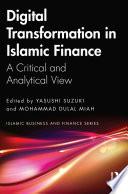
Dilemmas and Challenges in Islamic Finance
Looking at Equity and Microfinance
The phenomenal growth of Islamic finance in the last few decades has been accompanied by a host of interesting questions and challenges. One of the critical challenges is how Islamic financial institutions can be motivated to participate in the 'equity-like' profit-and-loss sharing (PLS) contracts. It is observed that Islamic banks are reluctant to participate in the pure PLS scheme which is manifested by the rising concentration of investment on murabaha or mark-up financing. This phenomenon has been the hotbed of academic criticism on the contemporary practice of Islamic banking. This book explains the 'murabaha syndrome' in light of the incentive provided by the current institutional framework and what are the changes required in the governance structure to mend this anomaly.
- ISBN 13 : 1351601857
- ISBN 10 : 9781351601856
- Judul : Dilemmas and Challenges in Islamic Finance
- Sub Judul : Looking at Equity and Microfinance
- Pengarang : Yasushi Suzuki, Mohammad Dulal Miah, Mohammad Dulal Miah, Mohammad Dulal Miah, Mohammad Dulal Miah,
- Kategori : Business & Economics
- Penerbit : Routledge
- Bahasa : en
- Tahun : 2018
- Halaman : 227
- Google Book : http://books.google.co.id/books?id=qnhQDwAAQBAJ&dq=intitle:Islamic+Entrepreneurship+Technology+Practice&hl=&source=gbs_api
-
Ketersediaan :
Colombo, M. G., and Grilli, L. (2010) 'On Growth Drivers of High-tech Start-ups: The Role of Founders' Human Capital and Venture Capital', Journal of Business Venturing, 25(6) pp. 610–626. Consultative Group to Assist the Poor.

